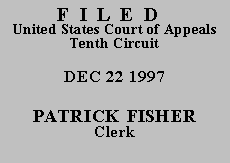

| DANNY E. SMITH,
Petitioner-Appellant, v. STEVE HARGETT, Respondent-Appellee. |
|
Petitioner Danny Eugene Smith was convicted in 1989 by the State of Oklahoma on charges of conspiracy and drug trafficking. Proceeding pro se, he sought a writ of habeas corpus from the district court pursuant to 28 U.S.C. § 2254. The district court denied relief, and petitioner now appeals. Following the initiation of his appeal, the district court denied petitioner a certificate of appealability. Petitioner filed a motion for a certificate of appealability. Subsequently, the Supreme Court held that the certificate of appealability provisions of the Antiterrorism and Effective Death Penalty Act of 1996 (AEDPA), Pub.L. No. 104-132, 110 Stat. 1214 (1996), are not applicable to cases filed before April 24, 1996, AEDPA's date of enactment. See Lindh v. Murphy, 117 S. Ct. 2059, 2068 (1997); see also United States v. Kunzman, 125 F.3d 1363, 1364 n.2 (10th Cir. 1997). Because petitioner filed his habeas application with the district court on November 9, 1995, prior to AEDPA's date of enactment, he does not need a certificate of appealability to proceed on appeal. He is, however, subject to the previous requirement of 28 U.S.C. § 2253 that he obtain a certificate of probable cause to appeal. As we held in Lennox v. Evans, 87 F.3d 431, 434 (10th Cir. 1996), cert. denied, 117 S. Ct. 746 (1997), overruled in part on other grounds by Kunzman, 125 F.3d at 1364 n.2, petitioner's burden is the same under either provision. In order to be eligible for a certificate of probable cause, petitioner must "make a substantial showing of the denial of a federal constitutional right." Id. (quotation omitted). We conclude that petitioner has made this showing, grant a certificate of probable cause, and consider his arguments on the merits. We exercise jurisdiction pursuant to 28 U.S.C. § 1291. Governed by the substantive habeas law prior to adoption of AEDPA, we review the district court's denial of habeas relief de novo on legal issues, see Sinclair v. Henman, 986 F.2d 407, 408 (10th Cir. 1993). We review the district court's factual findings for clear error, see Edens v. Hannigan, 87 F.3d 1109, 1113-14 (10th Cir.1996), affording a presumption of correctness to factual findings of the state trial court unless we determine those factual findings are not fairly supported by the record, 28 U.S.C. § 2254(d) (prior to amendment). Finally, we construe petitioner's pro se pleadings and briefs liberally. See United States v. Hardwell, 88 F.3d 897, 897 (10th Cir. 1996).
On appeal, petitioner raises three issues. First, he contends that his trial and appellate counsel were ineffective in various ways. However, our review of the record indicates that the majority of petitioner's complaints were not presented to the district court. This court does not generally address issues not raised below, and declines to do so here. See United States v. Edwards, 69 F.3d 419, 427 n.5 (10th Cir. 1995). The only arguments regarding alleged ineffectiveness of counsel properly preserved for review are petitioner's contentions that counsel would not raise or argue his double jeopardy claims in state court. "We review an ineffectiveness [of counsel] claim de novo, as it presents a mixed question of law and fact." Davis v. Executive Dir. of Dep't of Corrections, 100 F.3d 750, 759 (10th Cir. 1996), cert. denied, 117 S. Ct. 1703 (1997). Petitioner's second argument on appeal is that his conviction violates the Double Jeopardy Clause. We agree with the district court, for substantially the reasons set forth in the magistrate judge's report and recommendation, adopted by the district court, that petitioner's double jeopardy rights were not violated and that he has not demonstrated ineffective assistance in connection with these claims.
In his third argument, petitioner contends that the evidence at trial was insufficient to support his conviction on conspiracy charges. We have reviewed the trial transcript and agree with the district court that sufficient evidence was presented at trial such that a jury could have found that a conspiracy existed and that petitioner was part of that conspiracy.
The judgment of the United States District Court for the Western District of Oklahoma is AFFIRMED. The mandate shall issue forthwith.
Entered for the Court
Circuit Judge
*. This order and judgment is not binding precedent, except under the doctrines of law of the case, res judicata, and collateral estoppel. The court generally disfavors the citation of orders and judgments; nevertheless, an order and judgment may be cited under the terms and conditions of 10th Cir. R. 36.3.